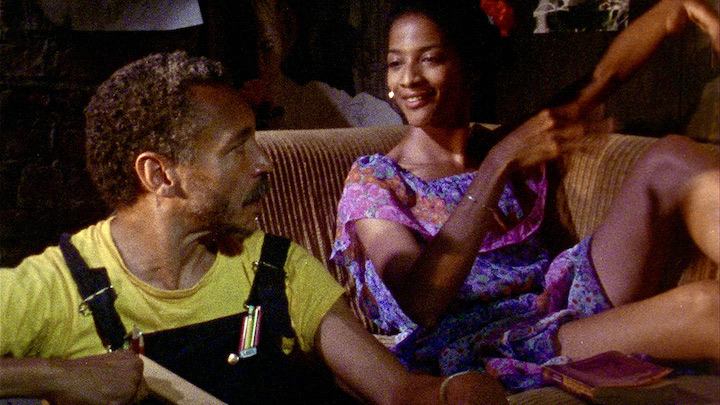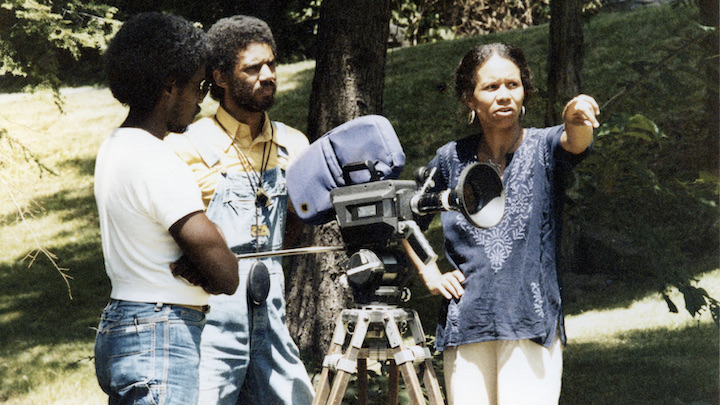Film Archive awarded Film Foundation grant to restore Kathleen Collins masterwork
The Yale Film Archive has received a grant to preserve Losing Ground, the 1982 masterwork of the late Kathleen Collins, a pioneering Black writer and filmmaker whose work was largely unseen for decades after her death in 1988 at the age of 46. One of the first Black women to direct a narrative feature film, Collins was much admired by her professional peers, but she struggled to get funding and distribution for her work.
The preservation grant from the Film Foundation with funding from the Hobson/Lucas Family Foundation will support the creation of a new digital master from the original 16mm film elements, a new 35mm film negative, and a restored 35mm optical soundtrack. These elements will allow production of 35mm prints for the first time. “This grant will help return to screens around the world an underseen film by an extraordinary writer and director,” says Brian Meacham, managing archivist in the Film Archive.
The impact of the film on students is profound because it shows a rarely represented view of middle-class Black life and reveals Collins as a towering talent, according to Terri Francis, who taught film at Yale from 2004 to 2013. “Losing Ground is a portal to not only a revised film history, but to the possibility of multiple varied and changing histories of film,” says Francis, now associate professor of Cinematic Arts and associate dean at the University of Miami.
About the Film
Losing Ground stars Seret Scott as Sara Rogers, a professor of philosophy researching the philosophical and religious meaning of the “ecstatic experience,” and Bill Gunn as her artist husband Victor, who rents a house in the country to celebrate his sale of a painting to a museum. Their summer idyll is complicated by Victor’s growing involvement with a young woman who models for him and Sara’s decision to return to the city to continue her research and act in a student film.
Losing Ground begins with Professor Rogers in the classroom speaking about existential philosophy, a subject Collins herself studied at the Sorbonne in Paris. The film is visually striking with saturated colors, scenes of pastoral beauty, and touches of the surreal. Collins drew on her own life story and identity—as an internationally known playwright, a voting rights activist, and professor of film—to present the life and marriage of a Black couple, in ordinary, everyday terms. The choice was itself a political statement, boldly asserting that the interior life of a Black woman seeking creative and professional fulfillment was a subject worthy of cinema.
“It’s also important that they are a professional couple representing different aspects of the humanities,” Francis says. “The source of the tension has to do with her need to do research during the summer while Victor wants to paint and create closer to his new inspirations. She’s more cerebral and logical while he’s more emotional. When she decides to act in the student film she crosses the line to his artistic territory.”
Losing Ground was premiered in June, 1982, at the Irvington, New York Town Hall Theater. It was not released theatrically, and its only New York City screening in Collins’s lifetime was in January, 1983, as part of the Museum of Modern Art’s Cineprobe series.
Rediscovering Kathleen Collins
The preservation work begins this month and should be finished by late 2022—but the project actually originated in 2011 when Terri Francis emailed Nina Lorez Collins, the filmmaker’s daughter, seeking a higher quality copy of the film for her class. Collins, who was writing a memoir about her mother, came to New Haven to visit. Francis made pizza and they sat at the kitchen table talking for hours. Francis recalls: “Nina was curious. She wanted to know, what does this film professor think about my mom, and her work? And I was like, oh I am here to tell you this is good, this is a great movie and your mom is amazing.”
With Francis’s advice and encouragement, Nina Collins raised funding for a partial restoration of her mother’s film and worked with Milestone Films to release it. In 2012, Collins donated the original 16mm film elements to the Film Archive, then known as the Yale Film Study Center. In 2015, Milestone showed Losing Ground at a Lincoln Center Film Festival to great acclaim. New York Times film critic A.O. Scott called it “a puzzle and a marvel, eliciting wonder and provoking questions.” Collins and her work are the subject of a growing body of scholarly work, and, a collection of her short stories, Whatever Happened to Interracial Love, was published in 2016.
Nina Collins believes that her mother, who would have turned 80 on March 18, would be pleased by the growing recognition. “It’s so moving see young Black women receive her work,” she says. “It would mean everything to her. She knew she was good. I think she would feel vindicated.”
Preservation Process
At the center of the preservation project is creating and preserving new high-resolution digital masters for both film and digital output, explains managing archivist Brian Meacham. Colorlab will scan the original A/B rolls at 4K. They will create a 4K film-out to 35mm color internegative using an Arrilaser. In the meantime, the existing soundtrack elements, including original track negative, 2013 track positive, and recently uncovered magnetic audio tracks of the film’s score, will be digitally captured at Audio Mechanics. Audio Mechanics will perform audio restoration and output a file which DJ Audio will shoot to a new, restored 35mm optical track negative. The new OTN will be printed with the new preservation 35mm internegative to create new 35mm prints, and the restored audio file will be paired with the new restored digital picture file to create a 4K DCP.
The currently available commercial release of the film is sourced from a high-definition transfer of a second-generation interpositive, and utilizes an unrestored audio track. By accessing the original negatives, and restoring the audio with the addition of newly-found magnetic sound elements for the score, this preservation project will result in major improvements in both picture and audio quality over the currently-available version, and will result in 35mm prints of the film for the first time.
An event and screening of the restored film at Yale is tentatively planned for fall of 2022.
Aug. 18, 2022 Story Update
The Yale Film Archive has received a matching grant from the National Film Preservation Foundation (NFPF) to preserve Kathleen Collins’s only other film, the 1980 short film, The Cruz Brothers and Miss Malloy. The project “safeguards the legacy of a pioneering African-American filmmaker,” the foundation said in its Aug. 18 announement. See the Yale Library news story.
—By Patricia Carey
In addition to cited sources and interviews, this story draws on descriptive and promotional text by Dennis Doros of Milestone Films and analysis of Collins’s work by Hayley O’Malley in “Art on Her Mind: The Making of Kathleen Collins’s Cinema of Interiority” (Black Camera 10, no. 2 (2019): 80-103). Images: Seret Scott and Bill Gunn in Losing Ground and Kathleen Collins filming Losing Ground, courtesy of Milestone Films.




